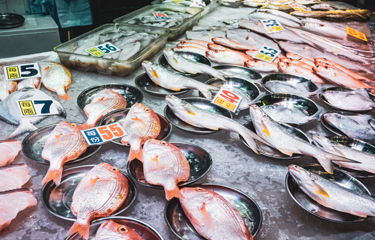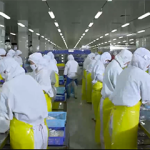New group in Hong Kong pushing government to get serious about traceability

A new database launched by an industry group in Hong Kong could prove a vital tool in triggering action towards traceability in one of Asia’s key trading hubs for seafood.
The Seafood Risk Assessment (SRA) website was launched during a webinar organized recently by the Hong Kong Sustainable Seafood Coalition (HKSSC) to help its seafood trading and buying members in Hong Kong better understand the sustainability risks of seafood imported into the city – which is a major trading hub for live reef fish and other seafood, some of which is trucked into mainland China.
Formed in December 2018, HKSSC seeks to unite seafood distributors, caterers, and retailers to promote seafood sustainability to weed out seafood products that may have come from illegal, unreported, and unregulated (IUU) fishing.
“People in the future can put forward any product and ask us to profile it,” HKSSC Technical Advisor Jacqui Dixon told SeafoodSource.
Dixon, who worked at seafood giant Pacific Andes prior to returning to her home of Cape Town, South Africa, from where she was asked to help with the establishment of the HKSSC in 2018, said the group is now seeking funding for a study of Hong Kong’s entire seafood supply chain.
“We want to map and trace products coming into Hong Kong,” Dixon said.
HKSSC members are provided with tools allowing them to judge the exposure to biological risk, illegal fishing, and traceability. If members could first find out exactly where species are coming from, that would be an achievement, Dixon said.
Dixon’s office is looking to U.S. philanthropic foundations for funding to hire researchers – ideally, a group of doctoral students that would track the types of transport for frozen and live seafood and where it’s warehoused. This, in turn, would allow HKSSC members to have a much better understanding of the data that needs to be collected to ensure their seafood supply chain is fully traceable.
“Hong Kong imports seafood from 170 countries, thus it’s hugely complex and [currently] there is very little documentation required,” Dixon said. “Tracking is better for frozen product shipped into Hong Kong, but less so for the various wild species like wild abalone from South Africa. There’s no regulation to check that.”
Modeled on the Sustainable Seafood Coalition in the United Kingdom, the HKSSC has received funding from ADM Capital Foundation, the charitable arm of an investment firm of the same name. But there are significant differences between the two countries that will make an exact replication of the SSC’s effort difficult. Compared to the U.K., Hong Kong’s seafood industry is made up of a large number of traders who are very margin-driven, explained Benjamin So, the chairman and the founder of seafood import firm 178 Degrees Co., a HKSSC member.
According to So, a lack of government regulation reduces vendors’ compliance with accurate country-of-origin labeling, particularly in the city’s large wet markets. And price is the main differentiator in the marketplace, he said, as “consumer sophistication is very low,” So said.
In response, the HKSSC has sought to increase awareness among consumers in Hong Kong, using live cooking demonstrations and social media to persuade locals to choose sustainable products.
So said the lack of a government code governing the traceability of seafood may relate to the pressure from industry to keep trade open – Hong Kong is a free port with tariff free entry to ensure the city’s status as a trading hub. But the situation may be changing, as Hong Kong has started to regulate imported meats – certificates of origin are now needed.
In November 2019, the Centre for Food Safety (CFS) in Hong Kong, under the Food and Environmental Hygiene Department (FEHD), found some discrepancies in the serial numbers of health certificates for exported meat issued by the Vietnamese authorities, who in turn found the papers to be forged.
Dixon said her organization hopes to see similar action on seafood traceability. But Hong Kong’s new Food Trade Portal doesn’t regulate seafood.
“Health certificates are currently voluntary or ‘encouraged.’ Therefore, there is a lot of low-hanging fruit,” Dixon said. “Our goal is to be able to go to the Hong Kong government and say, ‘Look, we have a list of members willing to collect data.’”
Improving traceability in such a deregulated market could provide a template for other localities wishing to do the same. Per-capita, Hong Kong ranks second in Asia in terms of seafood consumption and is the world’s eighth-largest seafood consumer overall. The 71.8 kilograms of seafood consumed on average per capita per year in Hong Kong is more than three times the global average, although local experts suggest this may be an overestimate due to large volumes of re-exporting that occurs on the island, as well as transshipments, which are often undeclared to avoid import tariffs in China.
Dixon said the HKSSC aims to expand its membership and is talking to the handful of retailers which dominate the Hong Kong grocery trade about joining. Its members. Currently, it has 15 members, comprised of 60 percent traders and 30 percent hotels, include the Peninsula and Mandarin Oriental hotel chains.
“Hotels are definitely further along the road in terms of wanting to source sustainably,” Dixon said. “However, hotel companies face huge complexities in fully tracing the origins of their seafood purchases. They could have over 100 species compared to 15 species for some trader. Therefore, it’s very difficult to get this into an Excel [spread]sheet. It’s not something you can achieve overnight.”
Looking to the future, Dixon said she is confident more traders will sign up to the HKSSC if buyers can be persuaded. Traders take notice of moves by the China-focused Shangri La hotel chain, which became the first in Asia to achieve Marine Stewardship Council chain of custody certification for all its 53 properties in 2018, and its suppliers, Dixon said.
“Traders see the writing on the wall. They see future demand [for sustainable, traceable product],” she said.
Membership could rise when the HKSSC starts to recruit in earnest, she said.
“We haven’t gone out and [actively] recruited yet,” said Dixon. However, So has been pleasantly surprised by initial talks with retailers. “One of them already has a program in place to identify species,” she said.
While the HKSSC has hosted several seminars for members in English, including webinars on tuna and abalone, with another planned on seafood fraud, So said he hopes to attract more interest with the is Chinese-language material the organization is now sourcing.
In the meantime, the HKSSC has hired an independent consultant to conduct a review of the its activity and operations to date “to assess if we are offering the right services and have the right objectives,” according to Dixon.
If all continues on track, the HKSSC could in time bring a major change to Hong Kong's seafood trade, especially if more large-sized corporate buyers are persuaded to join the initiative, So said.
"This is a long-term project," he said.
Yvonne Sadovy de Mitcheson, a professor at the Swire Institute of Marine Science at the University of Hong Kong (HKU) told SeafoodSource more Hong Kong businesses are becoming motivated to improve their sustainability metrics.
“There is clearly an interest to be able to source responsibly produced seafood by a growing number of traders, from family businesses to large companies," Sadovy de Mitcheson said. "A lot of this is genuine interest and some of it is probably more for image."
Sadovy said she believes the coalition helps members in two key ways to ensure the sustainability of its seafood supply.
“It has developed a practical assessment method which it applies to seafood types of interest to the coalition, [ranking] them according to level of risk and this allows businesses to make better choices when sourcing," she said. "This is a voluntary system. However, if more and more traders make lower-risk choices, this brings more of these to the market for consumers. This helps to raise the issue among the public and encourages/supports those low-risk sources.”
There are at least three important things that must happen to move toward greater traceability, Sadovy de Mitcheson said. The first is consumer choice for certified products. The second is for traders to pay attention to where their fish comes from. And the third is for government to support trader efforts through regulations that offer them "a level playing field by supporting and mandating for or incentivizing traceability, so that traders that want to do the 'right' thing are not disadvantaged.”
"If the HKSSC becomes big enough to speak with one voice, then it could have an influence on government to improve traceability," Sadovy said."
The HKSSC is important also due to its focus on species of interest to Hong Kong, according to Sadovy.
“Most certification systems globally do not yet include so many of these," she said.
Photo courtesy of estherpoon/Shutterstock






Share